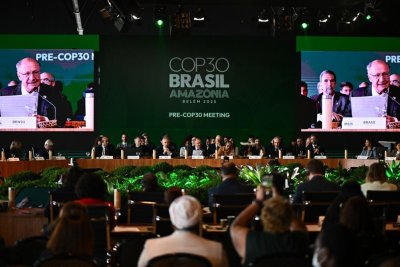
Brazilian Vice President Geraldo Alckmin (C) speaks during the opening session of the Pre-COP30 meeting at the International Convention Center in Brasilia, Brazil, on October 13. Photo by Andre Borges/EPA
Oct. 20 (UPI) — One month before the U.N. climate summit in Belém, Brazil, organizers face a serious accommodation shortage. The Amazonian city, which will temporarily serve as the nation’s capital during the event, lacks enough rooms for the thousands of visitors expected, threatening the participation of many delegations.
Amid a COP30 already marked by tensions over climate financing and carbon-reduction commitments, a new complication has emerged: hotel prices have soared, forcing Brazil’s government to organize cruise ships and makeshift lodging to meet demand.
The situation risks making COP30 one of the least inclusive in history, as many groups — including small nations, civil society organizations and media outlets — may lack the means to participate in one of the year’s most important climate meetings.
The 30th Conference of the Parties of the U.N. Framework Convention on Climate Change, or COP30, is to will bring together nearly 200 countries and dozens of organizations to negotiate actions to address the climate crisis.
The summit will take place in the heart of the Brazilian Amazon from Nov. 10 to 21, and aims to set new emission-reduction and climate-finance commitments through 2035 under the Paris Agreement.
It will be the first time the conference is held in the Amazon rainforest, a region vital to regulating the global climate.
The Brazilian government has pledged that no delegation will be left without lodging and has launched an official platform to coordinate reservations in hotels, private homes and vessels converted into floating hotels.
However, environmental groups and local media say prices remain out of reach for many delegations and that oversight is insufficient to prevent speculation. In some cases, rates have increased tenfold compared with previous years, even for modest accommodations.
The shortage of tourist infrastructure in Belém is also creating additional logistical challenges, including limited transportation, strained basic services and delays in key projects, such as the so-called “Leaders’ Village,” where heads of state will stay.
Diplomatic expectations for COP30 are especially high, as the summit will mark the start of a new cycle of climate commitments. Countries will be required to present updated proposals with targets extending through 2035.
However, the process is moving slowly and lacks ambition. Several major economies — including China, India and some G20 members — have yet to submit draft plans or have indicated they intend to maintain goals similar to those set in 2020, with few adjustments.
A preparatory ministerial meeting for COP30, held in Brasília last week, brought together representatives from more than 70 countries to coordinate positions and lay the groundwork for the summit.
During the sessions, ministers agreed that the conference should focus on the effective implementation of the Paris Agreement rather than issuing new political statements.
However, the meeting exposed persistent divisions on key issues, particularly climate financing. The draft of the so-called “Baku-Belém Roadmap,” which calls for mobilizing $1.3 trillion annually by 2035, drew criticism for lacking detail and verifiable mechanisms.
There were also disagreements over indicators to measure progress on adaptation and on the level of ambition for new national targets. The meeting kept dialogue open, but many core issues remain unresolved and will be the subject of direct negotiations in Belém under strong diplomatic pressure.